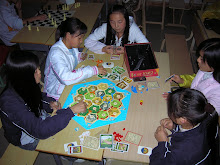In my first discussion of education in China I provided a chronological overview of education throughout the grade levels. A reader who has lived here for 3 years informed me that I had made a mistake about how college testing worked, and so this will be about testing.
China is a culture that, when looking at Bloom's Taxonomy, can only see "knowledge." At first I found against this idea because it left creativity to be discovered only by truly bold students, but then I began to understand. Memorization is the product of a culture that values tradition because those who can remember the tradition best are the members who are most valued (generally speaking). Also, the writing aspect of learning Chinese (and, to some extent, the reading) is a test in memorization on a massive scale. Students write characters over and over again hundreds or thousands of times in an effort to remember the character and improve their handwriting. My students can recite the same classic poems and remember famous Chinese writers with startling detail. The emphasis upon knowledge has led to an idea that there are "correct" and "incorrect" ways to do things. For example, if I were to write a character on the chalkboard, but not use the correct stroke order, the students would scream in unison, "wrong!" Does it matter that I wrote the character in the wrong order? That's an argument I love to take up with my students. The students were even asking me why I write a "t" with the vertical line first, as that doesn't follow stroke order for Chinese. "Is that American English stroke order?" they asked me.
All of this emphasis on knowledge and standardization has led to testing, which determines everything for a student. Participation in Band, Track, National Honor Society, or Debate Club are not helpful in seeking entrance to a good college. More helpful is a high Gao Kao score, which can be submitted to the school for acceptance or rejection. Depending on their score and the scores of other students that year, a student's Gao Kao might get them into a good or bad school (or somewhere between).
There is even a national standardized test for dancing. "There must be one correct way," is likely the idea behind this. If I were to guess, Kung Fu and Calligraphy also have tests (but I really don't know).
Testing is not a new idea in China, which convinces me that education really is a product of deep historical and cultural roots. During the Ming Dynasty people could take the civil service examination, which included only four books (Analects, Mencius, Doctrine of the Mean, and Great Learning) which were translated by the Song scholar Zhu Xi. One way to improve odds of success for these tests was to write the classics in small characters inside clothes. I believe cheating to be a product of overemphasis upon knowledge, and I think that any culture emphasizing knowledge more than application, synthesis, analysis or evaluation is likely to experience increased cheating. Once an increase in cheating happens for an extended period, this will likely help to redefine the culture's view of such behavior. I have seen and heard much about cheating in China and I have the idea that it's probably helped along by teachers and professors allowing it to happen.
Students who do well on the Gao Kao will usually go on to college for further study. Those who do not do well can stay in high school and study for an additional year before re-taking the test. With the increased pressure to get into a good school, this practice is more common that you might guess. Recently the test was changed from July to June, but the saying hasn't completely disappeared: "black July" is a time of intense heat and intense pressure as students nationwide take the Gao Kao and hope for a bright future.
Once students enter a college they tend to relax more. There are rarely all-day study sessions and being away from their parents allows them more friends or even the possibility of a boyfriend/girlfriend. Nonetheless, students are still under pressure from one or more of four tests: CET-4, CET-6, TEM-4, TEM-8.
The CET tests are two different English tests for non-English majors. The CET-4 is required for graduation of all non-English majors, and the same students can take the CET-6 for a bonus (it will likely help students to get an even better job). The same is true for English majors with the TEM tests: The TEM-4 is required for graduation and the TEM-8 will open more doors for these students.
There is a universal foreign language in China: English. Students all over campus study English and almost every student can speak to some extent. Whether or not they will speak to me in English is different due to the shyness and group-mentality of students.
As a poor test-taker, I am thankful that I was born in the American system of education. Opportunities can be found for students who get good grades, attend clubs, play sports, write for the newspaper, or do other extracurricular activities. The ACT or SAT isn't everything. Some students here believe that the Chinese system is unfair. These are the students who may not be attending the college of their choice (in fact, the vast majority of my students did not want to come to this school). It's likely that students attending better schools in larger cities feel the system is working just fine.
As China continues to grow and develop rapidly, the education system is certain to follow. I don't anticipate drastic changes in education and testing, but preparing students for a global economy may need to go beyond memorizing lists of information.
5.11.2008
Subscribe to:
Post Comments (Atom)








No comments:
Post a Comment